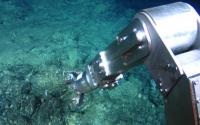Recent News

The author argues that U.S. non-party status to UNCLOS "continues to harm United States credibility and leadership in oceans matters and, more broadly, in our foreign policy."
[ More ]
Republicans are almost always in tune with the oil and gas industry, but they’re singing a different song on the drydocked Law of the Sea Treaty.
[ More ]
Senate Democrats’ hopes of passing the Law of the Sea Treaty sank Monday, when a pair of Republican senators announced their opposition to ratification. Sens. Rob Portman of Ohio and Kelly Ayotte of New Hampshire penned a letter to Senate Majority Leader Harry Reid (D., Nev.) saying, “we have concluded that on balance this treaty is not in the national interest of the United States.”
[ More ]
The Senate champion of the United Nations's maritime convention declared himself unfazed Monday by reports that opponents have garnered enough Republican opponents to kill the Law of the Sea Treaty if it ever comes up for a vote on the floor.
[ More ]
The author looks at how the U.S. could benefit from ratifying the Law of the Sea treaty by having one more tool in its arsenal to deal with an Iranian threat to close the Strait of Hormuz.
[ More ]
Ratifying the Law of the Sea Treaty (LOST) seems like a no-brainer. The treaty’s central provisions divvy up maritime territory among countries for the purposes of natural resource development. More than 160 countries have acceded to it, including the whole of the developed world. Iran, Syria, and North Korea oppose it while the Obama administration, five former Republican Secretaries of State, the U.S. military, and major affected industries all support ratification.
[ More ]
The authors, all of whom helped shape the UNCLOS treaty in previous administrations, argue that there are urgent economic and national security imperatives urging ratification of the treaty.
[ More ]
The author argues that if the U.S. wants to increase its access to Rare Earth Elements make domestic mining a more attractive investment then the Senate should ratify the Law of the Sea Treaty.
[ More ]
New marine research finds are fueling a gold rush as nations, companies and entrepreneurs race to stake claims to the sulfide-rich areas, which dot the volcanic springs of the frigid seabed. The prospectors — motivated by dwindling resources on land as well as record prices for gold and other metals — are busy hauling up samples and assessing deposits valued at trillions of dollars.
[ More ]
The author rebuts some of the common arguments against U.S. ratification of UNCLOS, arguing that the "cost of not acceding to the Convention is simply too high. If the U.S. does not accede to the Convention, we fail to unlock economic opportunities for U.S. companies and workers on the domestic front."
[ More ]